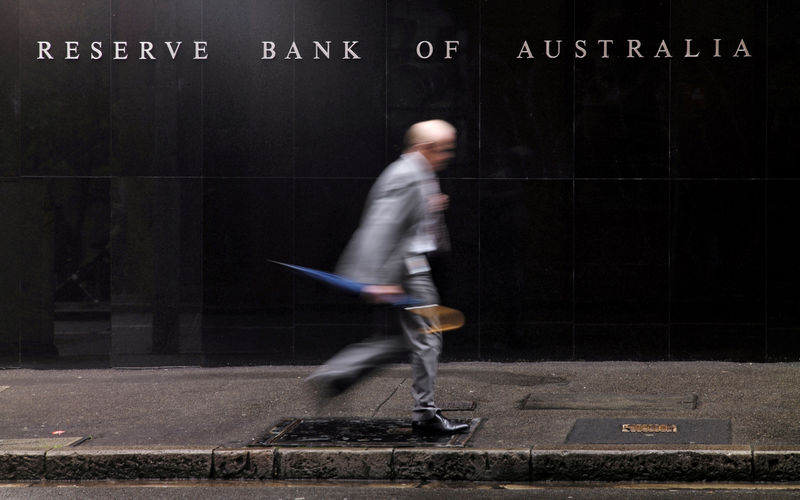Investing.com’s stocks of the week
By Swati Pandey and Wayne Cole
SYDNEY (Reuters) - Australia's central bank is seeking to be "a source of stability and confidence" by keeping rates at record lows as the future of Prime Minister Malcolm Turnbull was put in doubt by a leadership spill and sliding voter support.
The Reserve Bank of Australia (RBA) Board agreed the next move in the cash rate would more likely be an increase, Tuesday's minutes of its Aug. 7 policy meeting showed.
But the RBA stressed that keeping rates at 1.50 percent would help reduce the jobless rate and lift wage growth over time.
"Since progress on unemployment and inflation was likely to be gradual, (members) agreed there was no strong case for a near-term adjustment in monetary policy," the minutes stated.
"Rather, members assessed it would be appropriate to hold the cash rate steady and for the Bank to be a source of stability and confidence while this progress unfolds."
The RBA generally sounded more upbeat about the economy, citing recent strength in the labor market and strong business confidence.
A source of stability is greatly needed as growing political uncertainty takes its toll. A gauge of consumer confidence fell sharply for a third straight week, with falls across all sub-indices.
"The decline...may reflect the impact of the messy political debate locally and the associated slump in support for the current Turnbull government," said ANZ Head of Australian Economics David Plank.
Turnbull survived a leadership challenge by Home Affairs Minister Peter Dutton on Tuesday morning but the narrow margin of the win has sparked speculation about his future. Turnbull must return to the polls by May 2019 and could break the impasse by calling an early election.
No Australian prime minister has completed a full three-year term in the past decade.
"This type of political instability impacts business investment decisions and in turn hiring decisions. And that then has an impact on consumption," said Greg McKenna, market strategist at AxiTrader.
"If this intensifies, if it becomes real, then it will definitely weigh."
DROUGHT A DANGER
The RBA last cut rates to 1.5 percent in August 2016, notching up the longest period without a change in modern history. Financial markets <0#YIB:> are wagering this steady period could extend into 2020.
The bank spent some time discussing the effects of a severe drought that has stricken vast tracts of grazing and crop land in eastern Australia, the country's main food bowl.
"Members noted that the probability of an El Nino event, which would typically be associated with low rainfall in eastern Australia, had increased over 2018, implying downside risks to the forecasts for farm output and exports," it said.
Droughts are not uncommon in Australia, with one every eight to nine years, according to a research by the Commonwealth Bank of Australia.
Farming produces about 2 percent of Australia's A$1.8 trillion gross domestic product and economists generally expect a 0.2-0.5 percentage point hit to growth from a drop in farm output.
"While the impact can be significant, falls in farm output have never been large enough to derail an economy traveling at a decent pace," CBA chief economist Michael Blythe said in the note.
